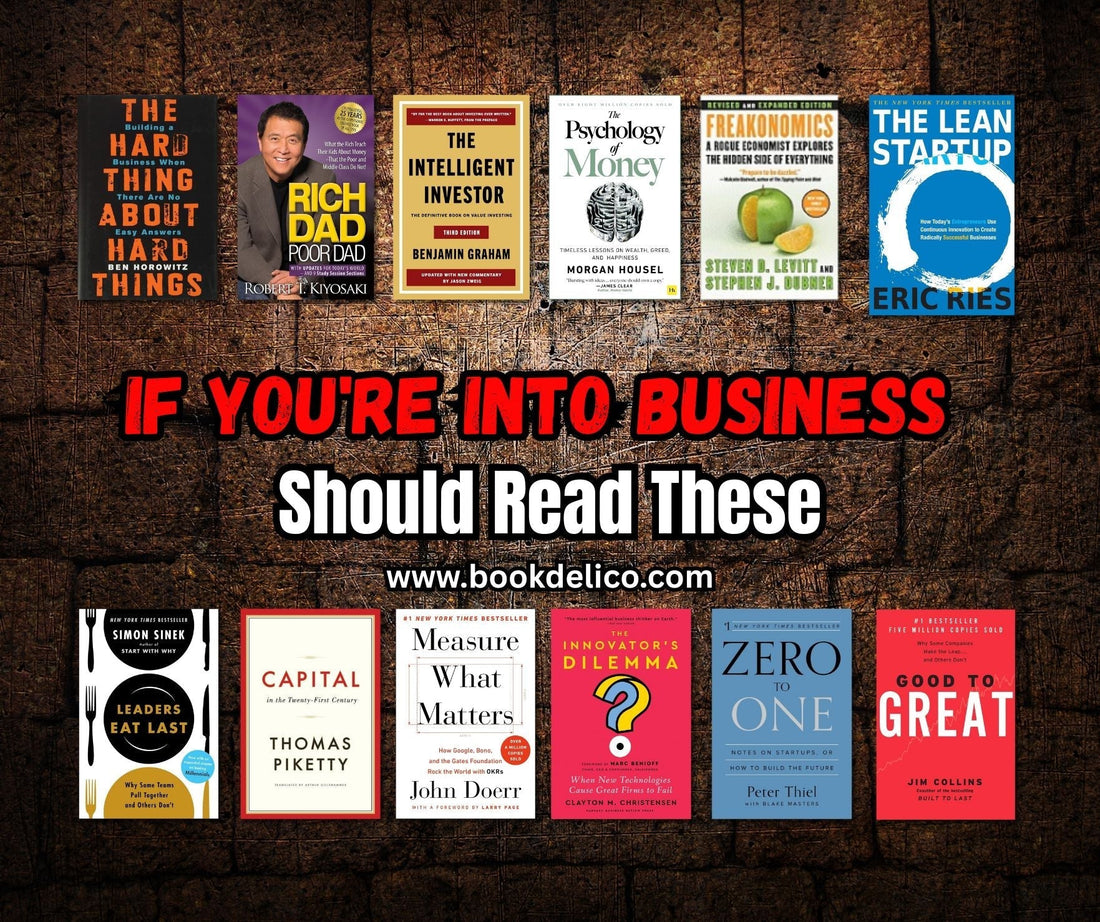
12 Business and Economics Books Every Entrepreneur Should Read
Share
Success in business isn’t just about talent or luck. It’s about mindset, decision-making, and learning from the best ideas out there. Books remain one of the most powerful ways to gain insights that can shape how you think about money, leadership, and innovation. Whether you’re an aspiring entrepreneur, a seasoned business leader, or someone interested in how economies really work, the right books can sharpen your vision.
This list brings together 12 must-read business and economics books that have stood the test of time. They cover strategy, leadership, investing, innovation, and the bigger forces that shape markets.
1. The Hard Thing About Hard Things by Ben Horowitz 
Running a company isn’t glamorous. Ben Horowitz, co-founder of Andreessen Horowitz, doesn’t sugarcoat the challenges. This book is raw, practical, and honest about what it really takes to build a business when there are no easy answers. If you’re a startup founder or leader, it’s a survival guide for the toughest decisions.
2. Rich Dad Poor Dad by Robert Kiyosaki 
This classic isn’t just about money—it’s about how you think about money. Kiyosaki contrasts two approaches: one focused on working for income, and the other on building assets. It’s an essential mindset shift for anyone looking to break free from financial dependence and create long-term wealth.
3. The Intelligent Investor by Benjamin Graham 
Known as the “bible of investing,” Graham’s principles remain timeless. Warren Buffett often cites it as the most influential book he’s ever read. If you want to understand value investing, risk management, and how to think long-term, this book is a must.
4. The Psychology of Money by Morgan Housel 
Money isn’t just math—it’s behavior. Morgan Housel explains why financial success has more to do with how you manage emotions, habits, and decisions than with complex formulas. This book is easy to read but packed with insights that can change how you handle money for life.
5. Freakonomics by Steven Levitt and Stephen Dubner 
Ever wondered why people make the choices they do? Freakonomics takes everyday situations and uncovers surprising economic truths behind them. It’s not a traditional business manual, but it sharpens the way you think about incentives, risk, and human behavior—skills that translate directly into business strategy.
6. The Lean Startup by Eric Ries 
Startups often fail because they build products nobody wants. Ries introduces the idea of “validated learning”—test, measure, adapt. This book is a game-changer for entrepreneurs looking to reduce risk, use resources wisely, and build something customers actually care about.
7. Leaders Eat Last by Simon Sinek 
A business isn’t just about profits; it’s about people. Sinek shows why trust, empathy, and servant leadership are at the heart of successful organizations. If you want to build strong teams that stick together through challenges, this is the book to read.
8. Capital in the Twenty-First Century by Thomas Piketty 
This heavyweight book dives into wealth inequality and the forces that shape global economies. It’s not light reading, but it gives critical context for understanding where markets, wealth, and business trends are heading. If you want the big picture of economics, Piketty delivers.
9. Measure What Matters by John Doerr 
Google, Intel, and countless startups have used OKRs (objectives and key results) to focus their goals and scale effectively. John Doerr explains how to set clear priorities and measure progress in a way that actually drives growth. For managers and entrepreneurs, it’s a playbook for accountability and results.
10. The Innovator’s Dilemma by Clayton Christensen 
Why do great companies fail when disruption hits? Christensen’s groundbreaking theory explains how innovation blindsides even the most established players. If you’re building a business today, this book helps you avoid falling behind tomorrow.
11. Zero to One by Peter Thiel 
Peter Thiel, co-founder of PayPal and early investor in Facebook, argues that true innovation is about creating something new, not just improving what exists. This book challenges you to think about building monopolies, creating unique value, and scaling from zero to something extraordinary.
12. Good to Great by Jim Collins 
Why do some companies make the leap from good to great while others stay average? Collins studied top performers and found the traits that set them apart: disciplined people, disciplined thought, and disciplined action. It’s one of the most influential business books ever written.
Why These Books Matter
Each of these books tackles a different piece of the puzzle. Some focus on personal finance and investing (Rich Dad Poor Dad, The Intelligent Investor, The Psychology of Money). Others zero in on business growth and leadership (Good to Great, Leaders Eat Last, The Hard Thing About Hard Things). And then there are books that shift your big-picture perspective on innovation and economics (The Lean Startup, The Innovator’s Dilemma, Capital in the Twenty-First Century).
Reading them isn’t about memorizing formulas or copying someone else’s playbook. It’s about reshaping how you think. The best entrepreneurs and business leaders never stop learning, and these books provide the mental tools to navigate uncertainty and seize opportunities.
Final Thoughts
If you’re serious about business, you can’t afford to ignore these books. They’ll help you make better decisions, manage money wisely, lead with purpose, and see opportunities that others miss. Start with one that resonates with your current goals, and work your way through the rest.
Knowledge compounds just like money does—the more you invest in it, the more valuable it becomes.

